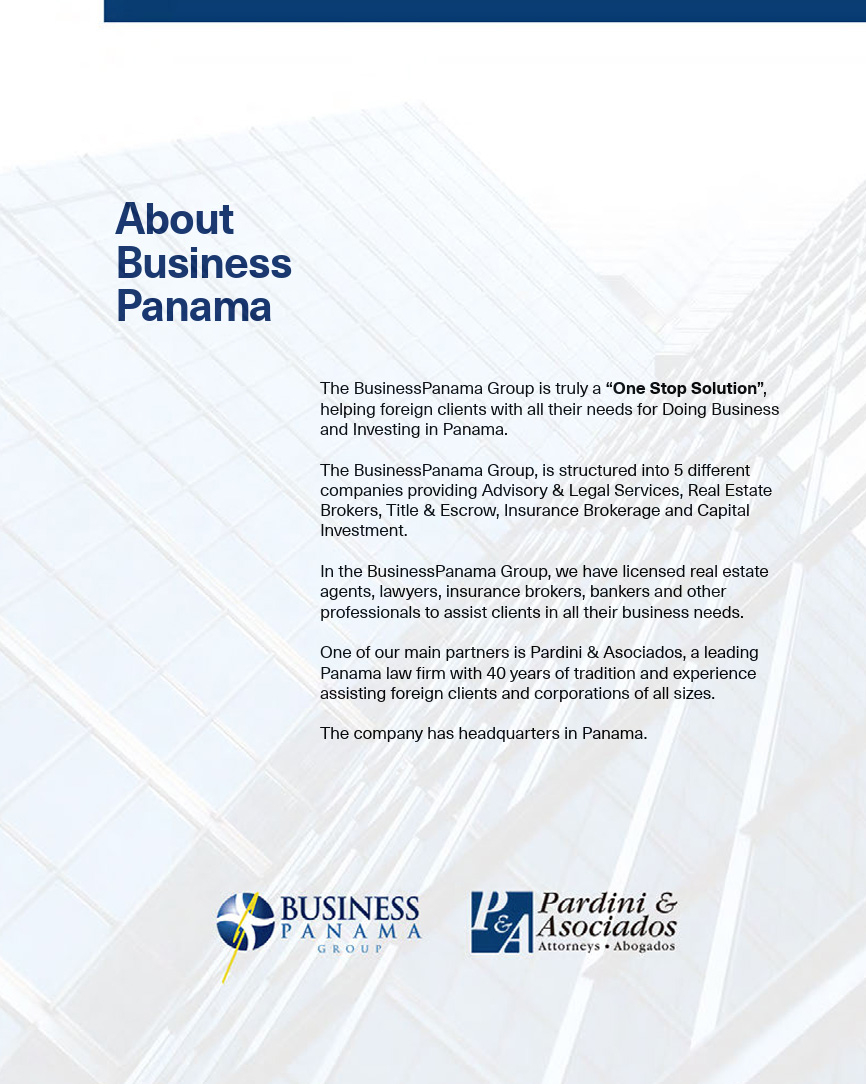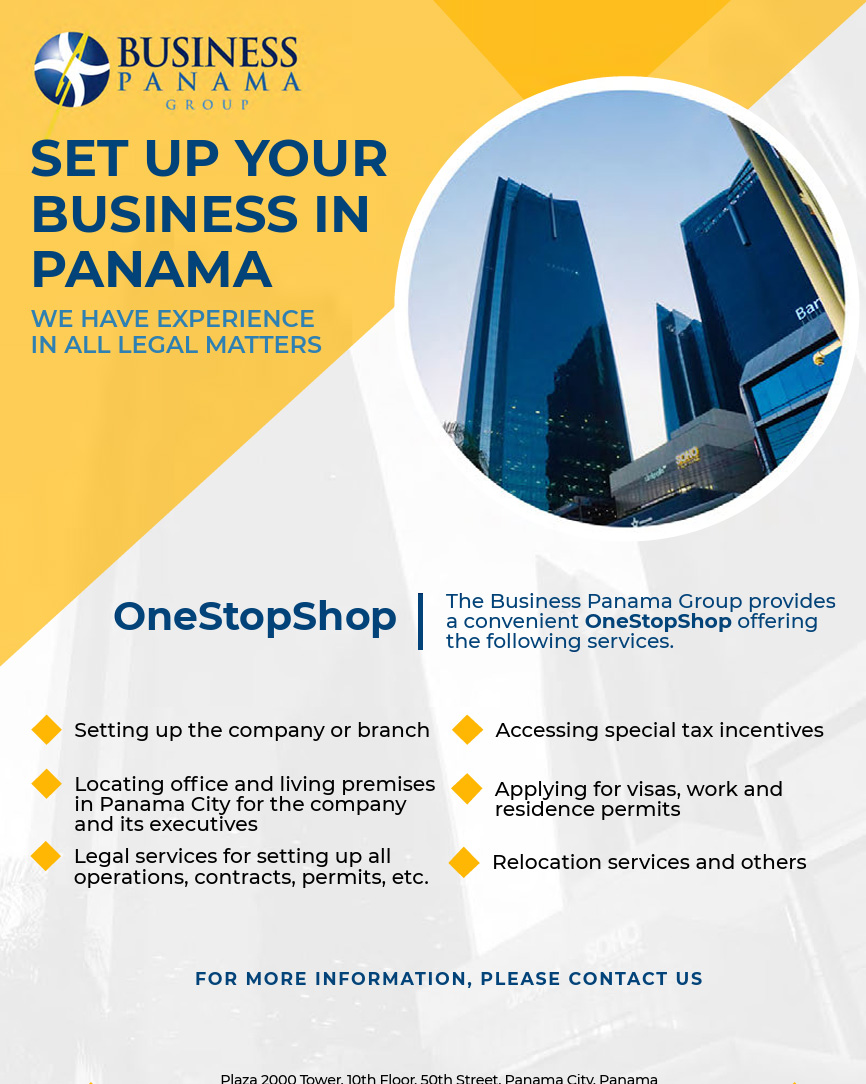
Panama Real Estate FAQs

How do I find a Property in Panama?
Make sure to contact a “licensed” real estate agent like Business Panama Real Estate.
Is it safe for foreigners to buy property in Panama?
Absolutely. Buying property in Panama is very safe. There are over a dozen laws in Panama established specifically for protecting foreign investments, not to mention that private property in Panama is protected by the constitution of the Republic of Panama. Thousands of foreigners or expats own property in Panama, and we process Panama real estate transactions for foreigners every day without a problem.
Are foreigners and entities controlled by foreigners permitted to own real estate directly, or are there specific license requirements or restrictions in place that must be complied with for a non-citizen to own real estate? Are there restrictions on ownership of beachfront or coastal land, or land near beachfront?
Foreigners are permitted to own real estate in Panama directly or through a legal entity. The only limitation is established in article 291 of the National Constitution, which stipulates that foreign persons or legal entities owned by foreign capital may not acquire properties located within 10 kilometers of the national borders.
Regarding beachfront properties, neither national nor foreigner persons may title property located within 22 meters from the highest tide line on the Pacific coast and 10 meters on the Atlantic coast. Concessions may be granted for their use; however, no permanent improvements may be made.
Is it legal for foreigners to buy property in Panama?
Yes, it is legal for foreigners to own titled property in Panama in their personal names, although we normally recommend that clients hold all property in the name of a Panamanian corporation or foundation for asset protection and tax reasons.
Can property be owned by a Panama Corporation as well as an individual?
Yes.
Can a Panama Corporation sell its shares?
Yes.
Is it safe to buy a Panamanian corporation’s shares which hold title to property in Panama?
As long as a proper due diligence investigation is done on the corporation and a proper title search is done on the property that the corporation holds, then it is generally safe to buy property this way in Panama. It is important to hire qualified attorneys to handle the due diligence, and put the proper clauses in the Buy/Sell Contract of Shares of the corporation, such as; (1) a clause that guarantees the buyer that the corporation does not have any pending debt or liability other than that established in the contract and indemnifies the buyer from any such liability, (2) a clause that makes the seller responsible for any liability for previous actions of the corporation and/or its directors, and (3) a clause that guarantees the buyer that the purchase is for 100% of the corporations shares as well as for 100% of the property title number xxx (with the description of the property), which is duly owned by the corporation, whose shares are owned by (the seller).
Please note that we work closely with Pardini & Asociados, a Panama law firm with 40 years experience.
Is it legal to buy options on property in Panama?
Yes, it is legal to buy options on property in Panama, however, it is an uncommon practice in Panama, and most sellers do not understand the concept.
Are options available on property in Panama?
Yes, you can buy options on property in Panama. However, most sellers in Panama do not understand the concept of options on property, therefore, it requires that you educate the seller in this concept so that they agree to offering you an option to purchase their property.
Do sellers offer owner financing or leases with purchase options in Panama?
Yes, leases with purchase options are common in Panama, although most sellers are interested in simply selling, not lease optioning. However, please note that rental or lease contracts must be registered with the MIVI (Ministerio de Vivienda), which is the “Ministry of Housing”; in order for the lease to be legal in Panama.
Who normally pays for the closing costs on Panama real estate transactions, the buyer or the seller?
Generally, each party pays for their own closing costs. For example, the seller pays his/her attorney to review the buy/sell contract, and the buyer pays his/her attorney for drafting the buy/sell contract, doing the title search, title transfer, and escrow services. However, in some cases, buyers and sellers negotiate special terms whereby the buyer or the seller pays all closing costs, so it really depends on the particular negotiation between buyer and seller.
Which party customarily pays taxes and fees in connection with a purchase/sale of real property – the purchaser or the seller? What is the allocation of responsibility between a purchaser and seller of all taxes and fees payable to consummate a conveyance of real property?
As mentioned above, purchasers are usually responsible for payment of all registration costs. Sellers are responsible for payment of the capital gain tax and the transfer tax. In addition, it is customary for the seller to cover any brokerage fee.
Is obtaining title free and clear of all encumbrances relatively safe and easy?
In Panama, all property titles are registered at the “Registro Público” (Public Registry) through a bureaucratic yet straight forward process, but we strongly recommend title insurance.
If I decide to Purchase Property, what should I know before I buy?
Before you purchase a property in Panama, it is important that you be aware, at least, of the following:
- Whether the property is titled or rights of possession.
- Whether the property has any restrictions, liens, encumbrances, easements, mortgages, etc.
- What is the registered value of the property
- Do the boundaries and measurements of the physical property match those registered in the Land Office
- If the property includes improvements, how many years of tax exemption are left.
- What will the property tax be? The maximum property tax is 2.1% yearly, based upon (a) registered value of the land, plus (2) declared value of the improvements built.
- Will the property serve my purposes? For example, if you wish to develop a tourism project, is the same located in a tourism zone as set forth by Ministry of Tourism.
- Who pays property transfer tax? Further to Panama law, property transfer tax is to be paid by Seller.
You can verify the information provided above by means of a due diligence, which should be undertaken by a team of experts, to include at least a surveyor and a lawyer.
How long does it normally take, from start to finish, to purchase a property in Panama?
The time frame from start to finish is normally about 6 weeks. However, it really depends on a variety of factors which are subject initially on the buyer and the seller, the negotiation between buyer and seller, and subsequently dependent on the attorneys and the Public Registry. Generally, property transactions have the following procedures:
- The buyer and seller to agree on the price and terms (time frame can vary depending on the negotiation),
- Seller provides our lawyers with all the due diligence documentation on the property title so we can do the title investigation (time frame depends on the seller),
- Our attorneys do initial title search & draft the promise to buy/sell contract (time frame is approx. 2 days, assuming we have all the required information from buyer and seller),
- Buyer and seller review the promise to buy/sell contract and agree to set a date to sign (time frame varies depending on the buyer and seller),
- Buyer wire transfer money for down payment to Seller and legal fees to us (time frame depends on the method funds were sent and the time the bank takes to make funds available),
- Buyer and seller sign promise to buy/sell contract and down payment is paid to seller,
- Final title search is completed (time frame is approx. 5 days),
- Buyer sends final payment (time frame depends on the method funds were sent),
- Attorneys draft final buy/sell contract (time frame is 3 days),
- Closing takes place and buyer/seller sign final buy/sell contract (time frame is 1 day),
- Contract is registered at the Public Registry for title transfer procedure to begin (time frame ranges from 2 to 30 days, depending on the Public Registry’s volume),
- Attorneys receive deed from Public Registry and prepare final documents to send to buyer (time frame is approx. 3 business days).
Are there any specific tax incentives relating to the purchase or development of real estate?
The principal incentives for the development of real estate projects in special tourism zones are contained in Law 80 of November 8th, 2012. Additionally, from time to time, the government enables an incentive of real estate tax exemption for up to 20 years for new constructions, but to confirm if it is currently available, please contact inquiries@businesspanama.com.
How is real property conveyed – by deed or other instrument of conveyance? What is the procedural process for completing a conveyance? Is there a registration or recording process?
Real property is conveyed by transcribing the sale purchase contract into a public deed. The purchaser and the seller sign a contract before a notary public. The seller will need to provide the corresponding certificates of good standing for the property and evidence that all related taxes have been paid (transfer tax and capital gain tax). The notary public then transcribes the text of the sale purchase contract and the text of the documents listed above, signs the public deed and then a fiscal stamp is attached to each page. The purchaser is then usually responsible for submitting such public instruments to the Public Registry and for paying the registration costs. Once submitted, a registration number is given, and the process begins. The document is reviewed by a Public Register staff member who determines if all the information is accurate and whether all the required formalities have been satisfied. This process usually takes approximately seven to ten working days, if no corrections or amendments are required. The parties may opt for an expedited registration by paying the Public Registry an additional fee.
Describe briefly the land registration system in effect in your country, its name, its basis of authority, and how it is maintained.
The land registration system was inherited from Spain. Historically, the unified land registration system in Mexico was implemented in 1528 as the Officio de Hipoteca (Office of Mortgage Recording) through a decree from the Court in Madrid as a worldwide initiative to implement a unified land registration system throughout the Spanish empire that would facilitate mortgage operations. Today, the registry is a centralized Public Registry Office entrusted with identifying and making known to the general public, though its records, all property and right over real estate with respect to an identified parcel of land (which includes ownership, mortgages, easements, priorities and certain types of tenancies).
How does the land registration system function? Who are the players?
There is a national cadastral office called “Catastro” (a registry of all the land within the country) and from which all properties are indexed. The players in the land registration system are the Registrar of the Public Registry Office and the notary. In a real estate purchase and sale transaction, the players also include the buyer and the seller. The notary, although usually paid by the buyer, does not act as counsel to any of the parties to the transaction. His function is merely to insure that the transaction is carried out pursuant to law. The purchase-and-sale transaction entails an extensive investigation by the lawyer acting for the buyer at the Public Registry Records of the chain of title (which refers to that sequence of registered documents capable of providing notice to subsequent purchases of the property) as well as of any liens placed on the property. Once the purchase-and-sale transaction has been closed and the public deed signed by the notary, the lawyer acting for the buyer has the responsibility to file the public deed for registration in the Public Registry.
Once title to a real property interest is registered, what is the effect of that registration (i) on the person in whose name the interest is registered, and (ii) on third parties?
Under Panama law, the right with respect to a real estate interest exists between the parties upon the registration of the transaction in the Public Registry. The registration of rights in the Public Registry also makes these rights known to third parties, and thus the rights can then be asserted against such third parties. As the Panama system is a race-to-register system, the recordation also affects the priority of liens placed on interest in real estate, not dependent on the date of closing.
What would be the effect on the interest in real property if it was obtained by means of a forgery or impersonation, or under fraud or duress.
It is highly unlikely that forgery or impersonation will occur because, in all real estate transactions, the notary must ensure and verify the identity of the parties. However, if this were the case, the transfer would be considered null and void, and the registration would have to be amended accordingly. As for a transaction carried out under fraud or duress, it should be noted that a key element to the purchase and sale agreement is consent. In the absence of consent, which would result if duress or fraud were at play, the transaction can be reversed (if deemed null and void) by judicial declaration.
What would be the effect on the interest in real property if the person transferring an interest in real property was incompetent.
Same as above. The notary has to be aware of the competence of the person appearing before him at the time the transaction is made. If the notary was aware of the incompetence, he could be held liable.
What would be the effect on the interest in real property if the title document used in the transaction was invalid.
Although the original copy of the “document” (which is in essence the public deed through which the seller originally secured title) must be presented at closing, and thus one could speculate at that time about the document having certain irregularities, the investigation at the Public Registry into the chain of title would uncover such irregularities (e.g., errors as to the identity of the owner, the price, description, and the like). If another document were invalid, for example, a power of attorney, then the transaction could be considered null and avoid.
What would be the effect on the interest in real property if the description of the real property interest were incomplete or inaccurate.
Upon the filing of a public deed, the Registrar verifies not only the form of the transaction, but also that the measurements and areas being affected or transferred match those set forth in the Public Registry. If the application contains inaccuracies or irregularities, it is refused registration and the Registrar advises of the reasons for refusing registration. With respect to legal remedies in the case of incomplete or inaccurate measurements, the buyer has the right to demand an abatement of the purchase price if the actual size is smaller than agreed upon. On the other hand, if the size is bigger than agreed upon, the buyer then has the obligation to supplement the original price. Since these obligations usually have to be judicially enforced, it is customary in cases where the property has irregular measurements to have the property surveyed and the actual measurements ascertained.
Who pays the holder of the real estate interest for loss or damage incurred by the holder because of the mistake or defect in a registration?
The general principles of civil liability apply in this case. The individual responsible for the mistake or defect will be responsible for compensating any loss. If the notary is responsible for the error, then the notary will be subject to liability. If the error was made by the Registrar, then ultimate responsibility resides with him. However, this will only be the case if the mistake resulted from negligent technical verification of the information submitted.
When an interest in real property is registered, is any value shown at full or market value or at some lesser amount?
The law requires that the full market value be shown at the time the transaction is carried out in order to calculate certain property taxes, including a transfer tax.
Are there laws permitting or contemplating condominiums or otherwise subdividing properties, or creating multiple ownership existing on one plot of land or building?
Yes, Panamanian Law recognizes Horizontal Property, which is similar to condominium property. Horizontal Property is a special type of property that creates real estate units, whereby individual ownership of units coexists with co-ownership over communal assets.
Horizontal Property is registered in the Public Registry under the Horizontal Property Regime Section and, as such, all owners must comply with the co-owner regulations.
Is a lender for a real estate project in your jurisdiction required to register or be licensed in such jurisdiction?
A private lender for a real estate project is not required to be registered or licensed, meaning the lender does not have to be a banking or financial institution. Loan contracts are governed by the Financial Code. However, if the lender is a banking or financial institution, it is required to be licensed by the Banking Superintendency and must comply with all financial regulations in force.
It is forbidden for any person, in or from the Republic of Panama, to raise funds from the general public, directly or indirectly, in the form of time deposits or in any other form, unless said person holds a license or authorization for this activity issued by a competent legal authority or regulatory entity, or said person is engaged in fundraising activities expressly exempt by law from any requirement for licensing, regulation or authorization.
What determines the priority of a mortgage, charge- or guaranty trust – the date of the loan, the date of execution of the mortgage, charge or guaranty trust, the date such mortgage or charge is actually recorded or registered, or some other factor?
The date that said mortgage or guarantee trust is registered or recorded before the Public Registry of Panama is the date the mortgage or guarantee trust is in force with respect to third party rights, as third parties are deemed to be on notice of the lien on the property.
Is there a standard schedule of legal fees for real estate transactions? If so, what is it, and is it based on a percentage of the transaction value or some other methodology?
The National Bar Association has established minimum fees for certain real estate matters. Matters not covered in the fee scheduled can be invoiced according to a mutually agreed fee.
Drafting of contracts for sale, leases, and other work of similar nature have fees which depend on the value of the respective operations, according to the following schedule:
- From US$0.01 to US$3,000 – US$200
- From US$3,001 to US$5,000 – US$250
- From US$5,001 to US$10,000 – US$275
- From US$10,001 to US$30,000.00 – US$400
- From US$30,001 to US$50,000 – US$500
- From US$50,001 to US$100,000 – US$800
- From US$100,001 to US$150,000 – US$1,500
- From US$150,001 to US$200,000 – US$1,550
- From US$200,001 to US$250,000 – US$1,575
- From US$250,001 to US$2,000,000 – 3.5 per cent
Fees for operations exceeding two million dollars (US$2 million) will be invoiced by a mutually agreed fee schedule.
In documents containing several operations, the fees will normally be calculated on the cost of each operation.
Business Panama Group together with Pardini & Asociados
provides a convenient One Stop Shop offering the services of...
Doing Business in Panama 2026
An essential reading for the investor or company setting up a business for first time in Panama. Get our guide Doing Business in Panama completely FREE on the link below.
DOWNLOAD NOW!




